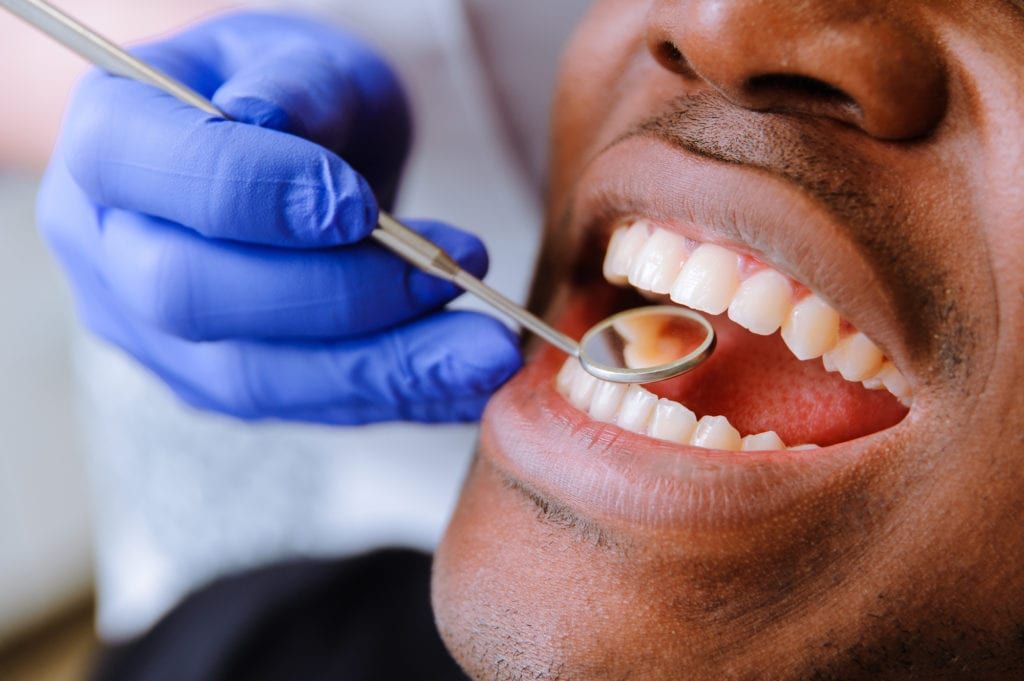Over 90% of all Americans have some type of tooth decay.
While most of us brush our teeth at least twice a day, sometimes that isn’t enough to keep our teeth healthy. That’s why professional teeth cleanings are so important.
But they can also be stress-inducing if you don’t know what to expect.
We’ve put together this guide to answer common teeth cleaning questions and walk you through what happens from the moment you sit in the dental chair to the moment you stand back up again.
So let’s get started!
Why Do I Need a Professional Teeth Cleaning?
You already brush and floss your teeth at home every day. Do you really need to get professional cleanings?
The short answer to this question is yes, and here’s why.
Your dental hygienist can clean the “hard spots” in your mouth that you have trouble reaching yourself. They also have the tools and experience that allow them to clean your teeth better than you can.
But more importantly, your dental hygienist can spot and address any signs of more serious conditions during the cleaning. This reduces your risk of developing gum disease and other related health problems later.
Because of this, you should schedule at least one teeth cleaning a year, but depending on your oral health, you may benefit from a cleaning every six months.
What Happens During a Cleaning?
Your dental cleaning will take about 30 minutes to an hour, and during this time, your hygienist will go through several different steps.
Examination
It all starts with a basic examination. This is the part where your dental hygienist will check for any signs of tooth decay, gum gingivitis, or other oral health issues. They’ll also look for areas with plaque or tartar that will need extra attention during the cleaning.
If they do find a potential problem during the examination, your hygienist will make a note of it, and they may talk to the dentist to ensure it’s still safe to move forward with the cleaning.
Plaque and Tartar Removal
Plaque is a bacterial film that covers the surface of your teeth after you eat. It’s what gives your teeth that textured or bumpy feeling. You can remove plaque on your own by giving your teeth a good brushing.
However, if you leave plaque alone for too long (about 48 hours), it will harder into tartar. Once this happens, you can’t get rid of it by yourself.
That’s why it’s so important to get a professional cleaning.
Your dental hygienist will use a tool called a scaler to scrape any plaque or tartar buildup off your teeth. You’ll hear a scraping sound, and you might feel pressure on your teeth, but the process shouldn’t hurt.
The hygienist might have to spend several minutes on this step. If you have a lot of plaque or tartar, this might be the longest part of your cleaning.
Brushing
Once they finish removing any plaque or tartar, your hygienist will brush your teeth with an electric toothbrush.
The toothpaste they use might taste the same as normal toothpaste, but it will fill grittier. This rougher consistency will help scrub and polish your teeth.
But you should never use this type of toothpaste at home.
Since it has a rougher consistency, this toothpaste can damage your enamel if you use it too often. While this toothpaste won’t damage your teeth during a professional cleaning, it’s not something you should use on a daily basis.
Flossing
Your dental hygienist will also spend some time flossing your teeth.
Even if you floss regularly at home, you might experience a small amount of gum bleeding during this step. This is because your hygienist can reach all the nooks and crannies you might not be able to get yourself.
Flossing will also help your hygienist remove any last debris they may have missed earlier.
Rinsing
Now your dental hygienist will give you a chance to rinse out your mouth. They may give you normal water to do this, or they may give you water that contains liquid fluoride.
Fluoride Treatment
Fluoride is a natural mineral that strengthens your tooth enamel. To finish the cleaning, your hygienist will coat your teeth in a gel or paste that contains fluoride and leave it there for at least one minute.
And if you’re worried about fluoride poisoning, don’t be. Fluoride is completely safe. In fact, fluoride is added to drinking water, and it benefits your oral and bone health.
Does a Professional Cleaning Hurt?
It depends on the person.
In most cases, you shouldn’t experience any pain during a professional teeth cleaning. That said, you might feel a small amount of discomfort during some of the steps, such as the flossing.
If you have sensitive gums or are worried about pain, make sure you talk to your dental hygienist before the cleaning. They may be able to administer a topical anesthetic before the treatment.
And talk to your hygienist during the cleaning. If something feels uncomfortable, let them know. They’ll do everything they can to keep you as comfortable as they can.
How to Schedule a Professional Teeth Cleaning
If you haven’t had a professional teeth cleaning in more than a year, you should schedule one as soon as possible.
Not sure who to contact? We can help! We provide quality dental cleaning services in the Wellington, Florida area.
You can schedule an appointment with us by calling 888-873-3558, or if you’re already a patient with us, click here to get in touch with us today!


